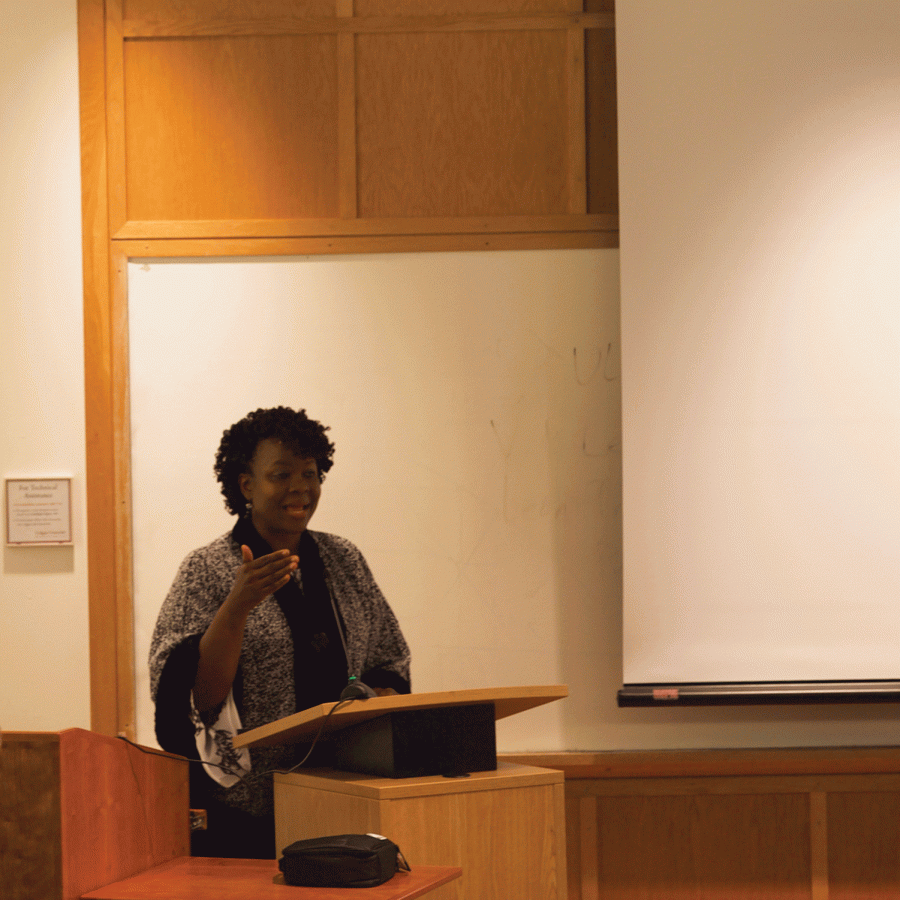Alumna Explores How Religious Structures Interact with Nation-building Efforts
On Thursday, October 26, Colgate’s Africana and Latin American Studies Program (ALST) hosted its biannual Shirley Gram and W.E.B. Du Bois Lecture Series. Emory University Associate Professor of Religion and African American Studies Dianne M. Stewart presented her lecture “The Nationality There is Methodist: The Black Church in America and Other Africana Religious Structures of Nation-building.”
Stewart is an alumna of Colgate’s Class of 1990, and received her bachelor’s degree in English and African American Studies. She went on to receive her master’s of divinity at Harvard Divinity School, and later received her doctorate degree in African diaspora religious thought from Union Theological Seminary. Currently, Stewart is writing a book on African Christianity based on her research in the Congo.
In her introductory remarks, Stewart paid homage to the lecture series title, explaining that Du Bois essentially laid the groundwork for black religious studies, particularly through his theoretical tool “double consciousness,” which describes internal conflict experienced by subordinated groups in an oppressive society.
Stewart also defined her use of the term “Africana” for the purposes of the lecture.
“[Africana serves] as a conceptual shortcut … [to describe] those in the African diaspora and African cultures,” Stewart said.
Stewart spoke to the role religion has in the formation of diaspora culture, and explained that the African church is deeply linked to identity-making processes, as well as cultural and spiritual citizenship in African traditions throughout the Americas and the Caribbean. In the slaveholding and colonial Caribbean, the African church contributed to a colonial consciousness and enabled oppressed populations to create a sense of shared being.
“African diaspora nations have been repositories for dynamic transformation and formation of African people groups,” Stewart said.
Stewart traced the history of the Yoruba people, an ethnic group in Nigeria and Benin whose regions altogether are known as “Yorubaland,” which serves as a trans-Atlantic formation of a Yoruba nation. She explained that an active evangelical presence in the Yoruba diasporas paved the way for pre-Yoruba micro nations to eventually form a Yoruba macro cultural nation that was not limited to a continental African nation. Due to the Atlantic slave trade, there is an extensive Yoruba diaspora that has communities in countries including Cuba, Dominican Republic, Jamaica, Brazil, Trinidad and Tobago, among others.
Stewart spoke at length about “orisha,” which in Yoruba religion is a spirit who reflects a manifestation of the supreme deity. She focused mainly on African-derived religions, with a lengthy focus on the Yoruba. In the Trans-Atlantic formation of Yoruba nation, ancestral connections with Yorubaland through religious ceremony became key for establishing nationhood, and a sense of community. Orisha religious ceremonies were held in “Palais,” or palace, which was the particular space that allowed for this community formation – this concept was brought into discussion with the Methodist church in America, to reveal a background into how the Methodist Church may be seen as a sort of nationality.
Stewart’s lecture showed how religious structures can facilitate nation-building across diaspora populations.
Contact Matt Leo at [email protected].







